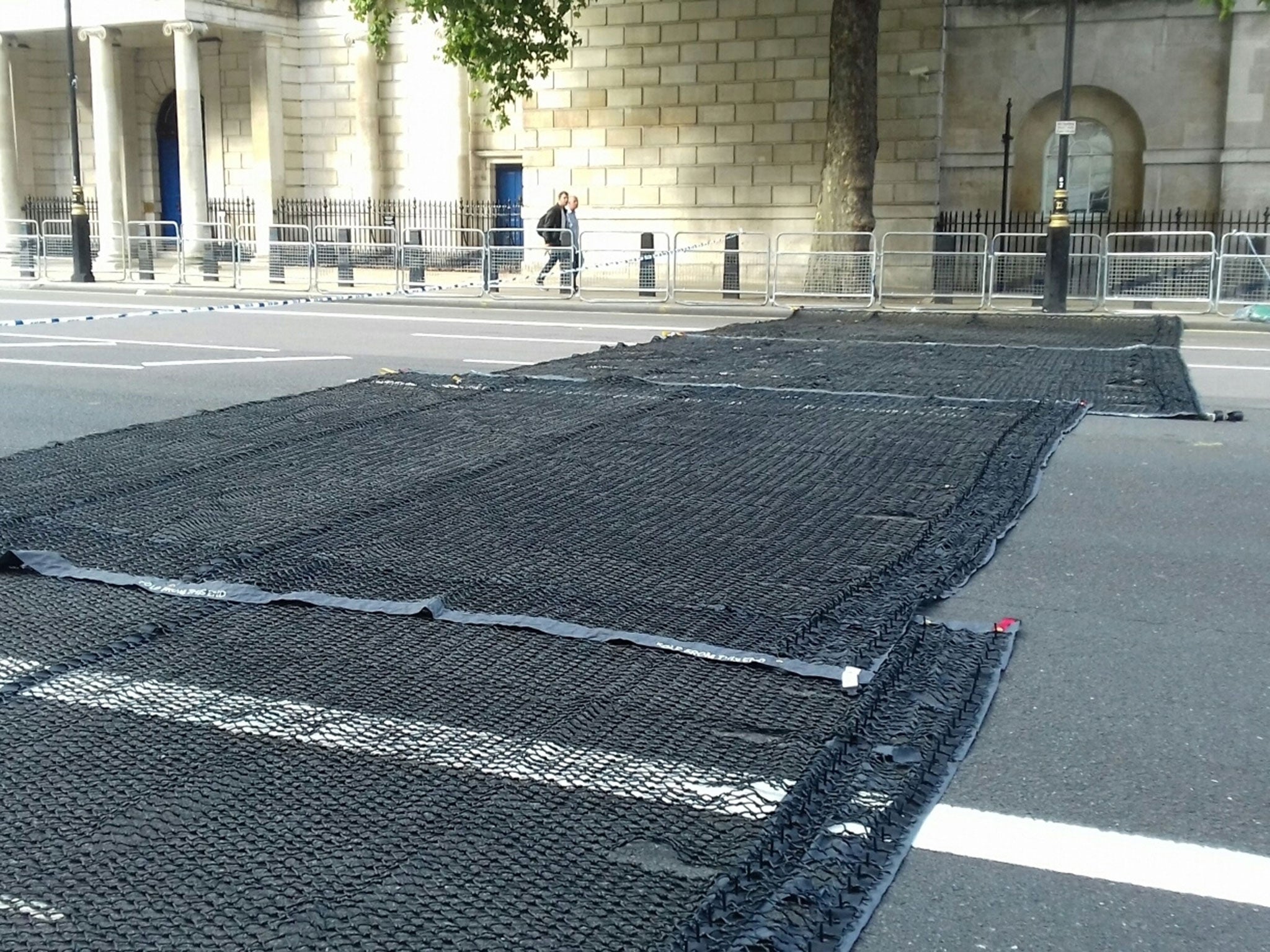'Talon' spikes introduced in London to halt vehicle terror attacks
Nets can stop lorries weighing up to 17 tonnes by puncturing wheels

Police in London have rolled out new protective equipment designed to stop vehicle attacks on crowds as security forces remain on high alert.
“Talon” nets containing metal spikes were laid out around the Naval Association Parade in Whitehall and Scotland Yard said they would soon become a familiar site at high profile events.
The nets are capable of stopping lorries weighing up to 17 tonnes by puncturing tyres and becoming tangled around the front wheels, bringing vehicles to a stop.
“The system is also designed to ensure that the vehicle skids in a straight line significantly reducing risk to crowds and producing a well-controlled stop after which officers can engage with the driver,” a spokesperson for the Metropolitan Police said.
“The net can be deployed quickly by just two officers in less than one minute.”
Concrete blocks and railings have already been installed on Westminster Bridge, London Bridge and around squares and meeting places in London.
Police said more “hostile vehicle mitigation barriers” would be installed following four terror attacks in the UK this year – three of which used vehicles.

The first came in March, when Khalid Masood drove into crowds on Westminster Bridge before stabbing a police officer dead outside the Houses of Parliament, killing five victims.
In May, 22 people were killed in the Manchester Arena bombing and weeks later, three terrorists attacked pedestrians on London Bridge with a van before going on a stabbing rampage in Borough Market.
An alleged far-right terrorist then drove into Muslim worshippers leaving a mosque in Finsbury Park on 19 June, killing one victim.
Lorries, vans and cars have been used in several terror attacks across Europe, including recently in Spain, and international security agencies remain on high alert as Isis continues attempts to incite similar atrocities.
The UK’s terror threat level remains at “severe”, meaning further attacks are considered “highly likely”.
Chief Inspector Nick Staley, of the Metropolitan Police’s protective security operations unit, said the “Talon” nets were just one of several measures being used in the UK.
“This equipment undoubtedly has the potential to save lives and is just one of a number of measures being taken to provide protection to crowds attending major events in London and reassuring businesses, workers and visitors as they go about their daily lives,” he added.
The announcement came after 14,000 people attended a charity concert at Manchester Arena, which reopened for the first time since March’s attack on Saturday.
Andy Burnham, the mayor of Greater Manchester, recited the names of Salman Abedi’s 22 victims before vowing: “Nothing will ever divide us.”
Amber Rudd, the Home Secretary, praised the “community spirit and resilience of the people of Manchester”.
“If the terrorists aim is not only to murder, but to sow discord and hatred in this country – then they again did not succeed,” she added. “Importantly, we will never forget those who lost their lives, and will continue to support the victims’ families.”
A new memorial to British people killed in terror attacks abroad has been commissioned from artist Alison Wilding and maker Adam Kershaw.
The National Memorial to British Victims of Terrorism Overseas, originally commissioned in 2015, will be entitled “Still Water” following a public consultation involving relatives of victims killed in atrocities in France, Algeria and Russia.
It will be installed at the National Memorial Arboretum, in Staffordshire, by the end of this year with a dedication likely to follow in spring.
Tobias Ellwood, the defence minister, said: “My hope is that this memorial will become a peaceful and contemplative site, offering solace and comfort to those affected by the terrible terrorist events that we have seen taking place overseas, and impacting on British citizens.”
British people have been injured in several recent atrocities in Europe and North Africa, including the Spain attacks, with the deadliest attack on UK citizens since the July 2005 bombings being carried out by an Isis militant in Tunisia in June 2015.
Join our commenting forum
Join thought-provoking conversations, follow other Independent readers and see their replies
Comments